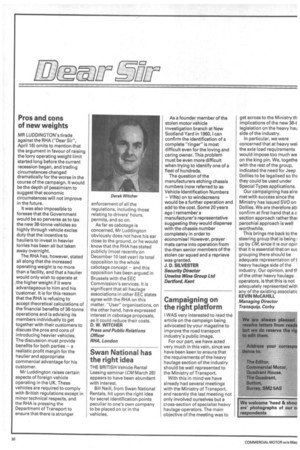Pros and cons of new weights
Page 32

If you've noticed an error in this article please click here to report it so we can fix it.
MR LUDDINGTON's tirade against the RHA ("Dear Sir", April 16) omits to mention that the argument in favour of raising the lorry operating weight limit started long before the current recession began, and trading circumstances changed dramatically for the worse in the course of the campaign. It would be the depth of pessimism to suggest that economic circumstances will not improve in the future.
It was also impossible to foresee that the Government would be so perverse as to tax the new 38-tonne vehicles so highly through vehicle excise duty that the incentive to hauliers to invest in heavier lorries has been all but taken away overnight.
The RHA has, however, stated all along that the increased operating weight is no more than a facility, and that a haulier would only wish to operate at the higher weight if it were advantageous to him and his 'customer. It is for this reason that the RHA is refusing to accept theoretical calculations of the financial benefits of 38-tonne operations and is advising its members individually to get together with their customers to discuss the pros and cons of introducing heavier vehicles. The discussion must provide benefits for both parties — a realistic profit margin for the haulier and appropriate commercial advantage for his customer.
Mr Luddington raises certain aspects of foreign vehicle operating in the UK. These vehicles are required to comply with British regulations except in minor technical respects, and the RHA is pressing the Department of Transport to ensure that there is stronger enforcement of all the regulations, including those relating to drivers' hours, permits, and so on.
As far as cabotage is concerned, Mr Luddington obviously does not have his ear close to the ground, or he would know that the RHA has stated publicly (most recently on December 10 last year) its total opposition to the whole cabotage concept — and this opposition has been argued in Brussels with the EEC Commission's services. It is significant that all haulage associations in other EEC states agree with the RHA on this matter. "User" organisations, on the other hand, have expressed interest in cabotage proposals, as it could reduce their costs. D. W. WITCHER Press and Public Relations Officer RHA, London
















































































































